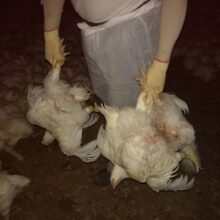International Poultry Services (IPS) is the largest poultry catching company in the Netherlands. It is under suspicion of exploiting their catchers and for human trafficking. An investigation into this matter was carried out by journalists from the well-respected investigative magazine Follow the Money (FTM). FTM reveals that IPS has previously been fined for forgery and employing illegal chicken catchers. Currently, Dutch and Belgian law enforcement agencies are investigating the company.

IPS catches as many as one hundred million chickens annually using predominantly cheap labor migrants. The work is demanding and dirty: tens of thousands of chickens must be caught at a rapid pace in large and dusty poultry barns. FTM’s investigation shows that labor exploitation rarely leads to prosecution, and when it does, the penalties are often lenient. Currently, there is a legislative proposal to simplify the criminalization of labor exploitation. Investigations into IPS are ongoing or pending review by the Public Prosecution Service. Nevertheless, IPS remains operational today.
Serious injuries caused by IPS
An inspection by the NVWA also revealed that IPS has caused serious injuries, including fractures and bleeding, in 7.6% of the broilers they caught. For more details, refer to this ruling from the court in Rotterdam >> Chicken catching often involves manual handling, with chickens being grabbed by one leg, several at a time and stuffed upside down into crates or containers.. Due to high work pressure and rough handling techniques, millions of chickens sustain injuries annually. In 2016, Eyes on Animals launched a project to reduce stress and injuries during catching. We trained multiple catching teams and introduced the alternative “gentle upright” catching method, which several poultry farmers now use. IPS is one of the companies that did not request any training or reach out to work with us.
Eyes on Animals welcomes the attention brought to the exploitation of migrant chicken catchers through FTM’s investigation. Through our training sessions and lectures, we have been advocating for improved working conditions for chicken catchers, including addressing high work pressure, working in dirty environments, low pay, and physically demanding, sometimes unsafe tasks. Catching companies that exploit their employees should, in our view, face severe consequences.

